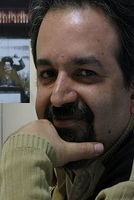
Shaahin Mohajeri is no stranger to untwelve.org, already having won 3rd prize in our 2011 competition for his piece Three Micromusics for an Ant. This year, his work Castle of Babak really stood out for our judges and landed him 2nd place. Living and working in Tehran, Shaahin not only composes, but is a master Tombak player, and is steeped in the musical tradition of his native Iran/Persia. Here is our final installment of competition interviews from the 2014-2015 competition, which was conducted by Chris Vaisvil.
UnTwelve: When you compose microtonally what are your methods and approaches?
Shaahin Mohajeri: Composing is a good time for me because I explore new microtonal imaginations. I use software (notation- Digital workstation and VST) for composing, and for simplifying things, I use common notation system without any microtonal accidentals for composing in any 12 tone microtonal scales.
UnTwelve: For a potentially electronic-only work, do you think there is a reason to commit music to paper anymore or has excellent modern recording equipment, sequencers, and digital audio workstations has made this activity less important?
Shaahin Mohajeri: Some people insist on composing with a pen and paper but as you know software has made everything simple. I can write or record by software and then edit it very fast...I can compose for microtonal virtual orchestra and hear it at the same time. Hearing microtonal melodies and harmonies and orchestral texture is very simple using software (instead of writing on paper) which is very useful for microtonal composing.
UnTwelve: Is live performance of microtonal music important?
Shaahin Mohajeri: I think live performance is a good challenge, to see [the] effect of microtonal music on players and listeners. One of my wishes is to educate some of my friends who play traditional Persian music, and retuning their instrument to play [some] composed [microtonal] music.
UnTwelve: Is there a microtonal culture or tradition that you look to for inspiration?
Shaahin Mohajeri: As you know tradional Persian music (Radif music) is based on tetrachords [that] contain microtones in the range of quarter tones. Growing [up] in this musical culture had a greate effect on me to think microtonally. I remember my first experiments with microtonality were retuning Radif melodies.
UnTwelve: Do you still use 12 equal?
Shaahin Mohajeri: If I want to compose some Radif music which has a Dastgah like "Mahur", I use major mode degrees, but not in 12-EDO. I retune the degrees according to 96-EDO...but I spend most of my time in microtonality.
UnTwelve: Do you think the album is dead with the buying of single songs with a click?
Shaahin Mohajeri: In Iran, buying album is more customary than any other way. But there are websites to buy songs and albums too. Some composers try not to release any album, but sell their music tracks via their website.
UnTwelve: Should music be free?
Shaahin Mohajeri: No ... and if we think so, how can a musician continue [in] his life? :-)
UnTwelve: What are your future plans for Microtonal exploring?
Shaahin Mohajeri: As told above steeping [myself] in microtonal melodies, and exploring [microtonal] harmony and polyphony.
UnTwelve: Should microtonal music be promoted as such or simply as music without calling special attention to tuning?
Shaahin Mohajeri: Microtonal music is simply music but with different effects. If some one asked me: "What kind of music is this?", what is my answer? I think there is a need to teach this kind of music and to change people's view of music. They must know that music is not based only on 12-EDO.
UnTwelve: What would be your dream microtonal situation?
Shaahin Mohajeri: Composing music for symphonic orchestra! Most of my ideas are orchestral and try to explore polyphony and my way of orchestration using sound samples and VSTs.